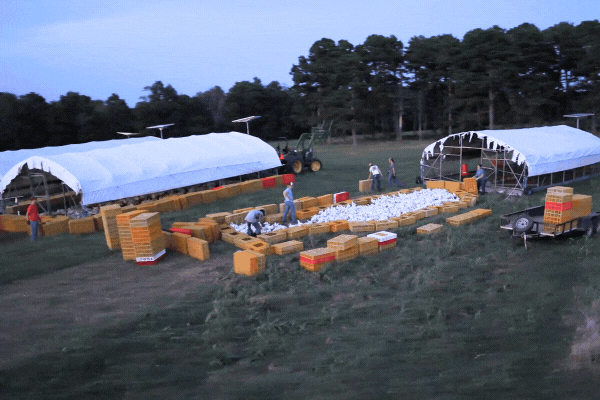Welcome to the Biggest Job of the Season

A look at our evening setup as we begin rounding up birds from the pasture by hand.
Every four weeks during poultry season (and every two weeks during the extra-crazy mid-season stretch) we face one of our most challenging weeks: chicken catch week.
Big birds that have been thriving on their daily pasture moves since moving out of the brooder at 2-3 weeks of age are ready for processing. That’s roughly 6,000 birds, or 40,000 pounds of chickens, are ready for harvest!
At the same time, the baby birds who’ve spent their first 2–3 weeks safe and warm in the brooder since arriving from the hatchery just hours old are ready to graduate into the pasture schooners, the mobile pens the big birds are leaving behind.
Enter hard work. Really hard work.
Over two nights, our catch crew carefully rounds up the big birds: seven pens the first night, four the second. Rain or shine, these folks are some of the most dedicated and hardworking people you’ll ever meet. Catching the birds at dusk, when they’re calmer and settling down, keeps stress low for both birds and crew.
Our chicken catch party kicks off about thirty minutes after sunset and runs late into the night. Each bird is gently loaded (just seven per crate) and lifted by pairs of strong arms onto trailers. Stacks reach as tall as we can safely manage, strapped down, and driven 40 minutes to the processor.
Then it’s time for the baby birds. Small, sleepy, and peaceful under the glow of our red headlamps (which are less disturbing for the chicks), they’re carefully loaded into crates (35–45 per crate, depending on size) and transported to the freshly cleaned and prepped pens. By morning, they’re settled into lush pastures for the next 4–5 weeks of bug-chasing, starry skies, and daily moves before their final journey.
Our crew is a mix of farm heroes: Chuck, Jason, Chris, Cody, and me; our spouses and kids; a few dedicated local teens who’ve grown up catching with us; and a handful of others who come and go. I’m endlessly proud of every one of them - the care they show the birds, the grit they bring through long nights and early mornings, and their willingness to keep going even when the weather is anything but ideal.
After the catch, it’s brooder clean out and reset, preparing for the next batch of chicks the following week.
It’s hands down the hardest week for any pastured poultry farmer and their crew. And yet, once it’s done, we breathe a little easier. Back to daily moves, regular care, and a slightly calmer schedule…at least until the next big catch week rolls around!
Your farmer,
Andrea
Falling Sky Farm, Arkansas






